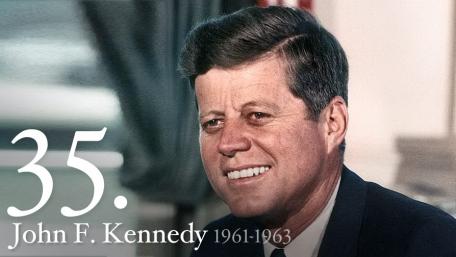
John F. Kennedy, the 35th President of the United States, served from January 20, 1961, until his assassination on November 22, 1963. His presidency, though brief, was marked by significant events and challenges, including the Cold War, civil rights struggles, and the space race. This article provides an in-depth timeline of Kennedy’s presidency, highlighting key dates and milestones.
Early Presidency and Domestic Challenges: 1961
- January 20, 1961: John F. Kennedy is inaugurated as the 35th President of the United States. His inaugural address includes the famous line, “Ask not what your country can do for you—ask what you can do for your country,” setting the tone for his presidency and inspiring a sense of public service and civic duty.
- February 1, 1961: Kennedy establishes the Peace Corps through an executive order. This program is designed to provide assistance to developing countries and promote American values abroad. The Peace Corps becomes one of Kennedy’s most enduring legacies, symbolizing his commitment to global humanitarian efforts.
- April 12, 1961: Soviet cosmonaut Yuri Gagarin becomes the first human to orbit the Earth. The successful mission heightens the space race between the United States and the Soviet Union, intensifying Kennedy’s focus on space exploration and technological competition.
- April 17-19, 1961: The Bay of Pigs invasion occurs. The CIA-backed operation to overthrow Cuban leader Fidel Castro fails disastrously, leading to a significant embarrassment for the Kennedy administration and increasing tensions with Cuba. Kennedy takes responsibility for the failure and learns valuable lessons about covert operations and international diplomacy.
Cold War and Foreign Policy: 1962
- June 4, 1962: Kennedy delivers a major speech at American University in Washington, D.C., advocating for peace and understanding with the Soviet Union. The speech, known as the “Strategy of Peace” address, seeks to ease Cold War tensions and promote a more cooperative international stance.
- October 14-28, 1962: The Cuban Missile Crisis unfolds when U.S. reconnaissance flights reveal Soviet nuclear missiles in Cuba. Kennedy responds by instituting a naval blockade of Cuba and demanding the removal of the missiles. The crisis brings the world to the brink of nuclear war but ends with a negotiated agreement for the withdrawal of Soviet missiles and a U.S. pledge not to invade Cuba. The resolution is seen as a significant diplomatic victory for Kennedy.
- November 22, 1962: Kennedy delivers his famous “We choose to go to the Moon” speech at Rice University. He sets a goal for the United States to land a man on the Moon by the end of the decade, reinforcing the commitment to space exploration and technology advancement.
Civil Rights and Domestic Policy: 1963
- June 11, 1963: Kennedy delivers a national address on civil rights, calling for comprehensive legislation to address racial segregation and discrimination. His speech represents a significant moment in the civil rights movement and reflects his commitment to achieving racial equality.
- June 19, 1963: Kennedy signs the Equal Pay Act into law. This legislation aims to eliminate wage disparity based on gender, marking a significant step toward gender equality in the workplace.
- August 28, 1963: The March on Washington for Jobs and Freedom takes place, where Dr. Martin Luther King Jr. delivers his famous “I Have a Dream” speech. Kennedy’s administration supports the march and the movement for civil rights, though the President is not present at the event.
- October 2, 1963: The Department of Housing and Urban Development (HUD) is created through an executive reorganization. This new department is tasked with addressing issues related to urban development and housing, reflecting Kennedy’s focus on improving living conditions and addressing urban poverty.
Assassination and Legacy: 1963
- November 22, 1963: John F. Kennedy is assassinated in Dallas, Texas, while riding in a motorcade with his wife Jacqueline, Texas Governor John Connally, and Connally’s wife Nellie. Kennedy is struck by two bullets, and he is pronounced dead at Parkland Memorial Hospital. Vice President Lyndon B. Johnson, who was traveling with Kennedy, is sworn in as the 36th President aboard Air Force One.
- November 25, 1963: Kennedy’s funeral takes place in Washington, D.C. The nation mourns the loss of its President, and the event is marked by a solemn procession and a state funeral attended by world leaders and dignitaries.
- 1964: The Warren Commission, established by President Johnson, investigates Kennedy’s assassination. The Commission concludes that Lee Harvey Oswald acted alone in killing Kennedy, though conspiracy theories continue to surround the event.
Legacy and Impact
John F. Kennedy’s presidency, despite its brevity, left a lasting impact on American history and global affairs:
- Space Exploration: Kennedy’s commitment to space exploration, highlighted by his Moon landing goal, accelerates the U.S. space program and leads to significant achievements, including the Apollo 11 Moon landing in 1969.
- Civil Rights: Kennedy’s advocacy for civil rights and his support for legislation like the Equal Pay Act contribute to the advancement of racial and gender equality. His leadership during the civil rights movement lays the groundwork for future reforms and social progress.
- Foreign Policy: Kennedy’s handling of the Cuban Missile Crisis demonstrates his diplomatic skills and ability to manage Cold War tensions. His approach to international relations and the promotion of peace helps shape U.S. foreign policy during the early 1960s.
- Public Service and Inspiration: Kennedy’s call to public service and his inspirational speeches resonate with Americans and become a lasting part of his legacy. His vision for a more engaged and active citizenry influences future generations.
Conclusion
John F. Kennedy’s presidency, though cut short by tragedy, is remembered for its dynamic leadership, significant achievements, and enduring impact on American history. His handling of Cold War crises, commitment to civil rights, and vision for space exploration define his legacy as a President who faced immense challenges with courage and innovation. Kennedy’s influence continues to be felt in contemporary American politics, culture, and global diplomacy.